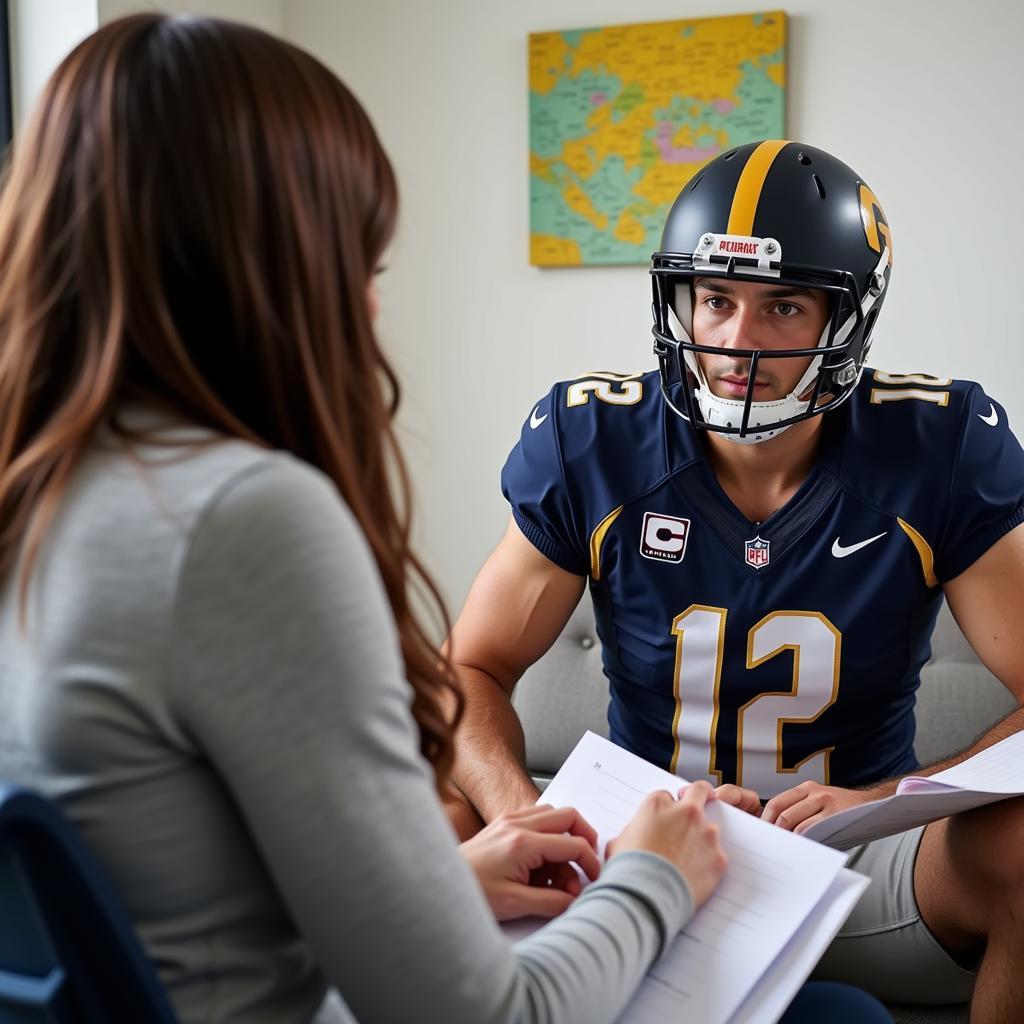What Language Do Football Players Speak?
November 3, 2024Communication is key in any team sport, and football is no exception. Understanding how players from diverse backgrounds communicate effectively on the pitch is fascinating. So, what language do football players speak?
The Universal Language of Football
While many assume English is the dominant language in professional football, the reality is more nuanced. Players often communicate using a mix of their native languages, English, and a universal “football language” made up of gestures, signals, and short, commonly understood phrases. This non-verbal communication is crucial for quick plays, tactical adjustments, and maintaining team cohesion. Think about it: a quick glance, a pointed finger, a hand signal – these can all convey crucial information in the blink of an eye, regardless of language barriers.
The Role of English in International Football
English does play a significant role, especially in international leagues and tournaments. It’s often used as a common language among players who don’t share a native tongue. Many clubs also employ translators and language coaches to help players integrate and communicate effectively. This allows for clearer communication during training sessions, team meetings, and matches. However, even within teams where English is widely spoken, players often revert to their native languages for casual conversations and off-the-pitch interactions.
Navigating Linguistic Diversity in the Locker Room
The locker room becomes a melting pot of languages and cultures, reflecting the global nature of modern football. This diversity can be a source of strength, fostering camaraderie and understanding between players from different backgrounds. It can also present communication challenges, requiring teams to develop strategies for effective multilingual communication. Many teams have established cultural integration programs to help players learn basic phrases in each other’s languages and understand cultural nuances. This promotes respect and strengthens team bonds.
Common Languages Heard on the Pitch
Besides English, several other languages are commonly heard on football pitches worldwide. Spanish, Portuguese, French, German, and Italian are prominent due to the large number of players hailing from these language-speaking countries. The specific languages used within a team often depend on the club’s location and the nationalities of its players.
The Power of Non-Verbal Communication
In the fast-paced world of professional football, non-verbal communication is often just as important as spoken language. Players develop a shared understanding of gestures, signals, and body language that allows them to coordinate their movements and execute complex plays. This unspoken language transcends linguistic barriers, enabling players to communicate effectively regardless of their native tongues. Imagine a crucial moment in a match: a quick nod from a teammate can signal a pass, a raised hand can indicate a run, a pointed finger can direct a defensive move. These non-verbal cues can be the difference between scoring a goal and missing an opportunity.
How Players Adapt and Learn
Many players learn new languages during their careers, driven by the need to communicate effectively with teammates, coaches, and media. Immersion in a new linguistic environment, combined with formal language training, helps players develop proficiency over time. This dedication to communication not only benefits their performance on the pitch but also enriches their personal and professional lives.
 Football player having a language lesson
Football player having a language lesson
Conclusion
So, while English serves as a common language in many football settings, the true language of football is much richer and more complex. It’s a combination of spoken words, gestures, shared understanding, and a constant adaptation to linguistic diversity. This multifaceted approach to communication is what makes football a truly global sport, bringing together players and fans from all corners of the world. Understanding the dynamics of language in football provides a fascinating glimpse into the intricacies of teamwork, cultural exchange, and the universal passion for the beautiful game.
FAQ
-
What is the most common language spoken in football? While English is widely used, a combination of native languages, English, and non-verbal communication forms the true language of football.
-
Do football players need to learn English? English is beneficial, especially in international leagues, but non-verbal communication and other languages also play significant roles.
-
How do players from different countries communicate on the field? They use a mix of their native languages, English, and a universal football language of gestures and signals.
-
Are there translators in football clubs? Yes, many clubs employ translators to facilitate communication between players and staff from different linguistic backgrounds.
-
What are some other common languages in football? Spanish, Portuguese, French, German, and Italian are frequently heard due to the global nature of the sport.
-
How important is non-verbal communication in football? It’s crucial for quick plays, tactical adjustments, and maintaining team cohesion.
-
Do players learn new languages during their careers? Many players learn new languages to communicate effectively with teammates, coaches, and the media.
Need more support? Contact us at Phone Number: 0396443476, Email: [email protected] or visit us at 23 Tháng 3, Đắk Nia, Gia Nghĩa, Đắk Nông, Vietnam. We have a 24/7 customer service team.